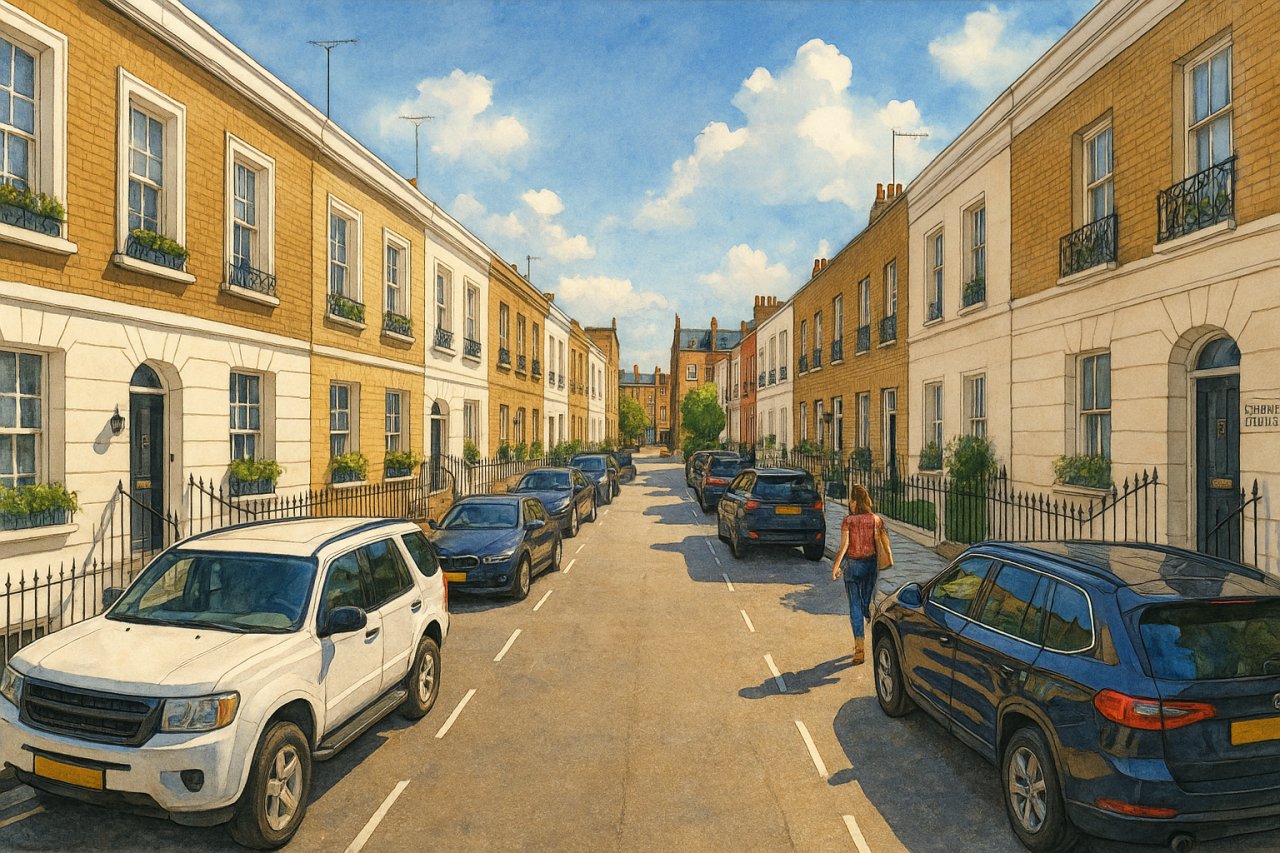
Graham Terrace, London
Graham Terrace is a graceful and quiet residential street in the prestigious district of Belgravia, within the City of Westminster. It runs in a one-way direction from Bourne Street in the south to Eaton Terrace in the north. Although not widely known to tourists, Graham Terrace embodies the classic charm of Belgravia’s white stucco terraces and orderly urban layout. It shares many characteristics with its neighbour, Caroline Terrace, including architectural form and traffic regulation.
Layout and Traffic Flow
Graham Terrace measures approximately 120 metres (about 400 feet) in length. It is designed for one-way vehicular traffic heading northbound, beginning at Bourne Street and terminating at Eaton Terrace. The narrow roadway, flanked by historic terraced houses, is typical of Belgravia’s 19th-century planning ethos — elegant, efficient, and refined in scale.
History and Name Origin
Graham Terrace was developed in the early to mid-19th century, during the grand period of Belgravia’s construction under the auspices of the Grosvenor Estate. This period transformed what was once marshland into one of the capital’s most prestigious residential areas.
The street is believed to be named after a member of the Graham family, possibly referencing a tenant or associate of the Grosvenor family or a figure of local significance at the time. The name Graham is pronounced GRAY-um, and its phonetic representation in the International Phonetic Alphabet is /ˈɡreɪ.əm/. 
Character and Streetscape
Graham Terrace is characterised by its Georgian and early Victorian architecture, featuring three- and four-storey stucco-fronted houses with classic iron railings, sash windows, and occasionally columned porticos. The street is residential, peaceful, and leafy — much like the surrounding Belgravia enclave — and is home to a mixture of long-term residents and international homeowners.
While it lacks commercial premises, its location provides immediate access to the elegant lifestyle of Belgravia, with boutique shopping, fine dining, and landscaped squares all nearby. The consistent architectural palette lends the street a timeless dignity that appeals to both locals and property investors.
Streets connected to Graham Terrace
Nearby Sights and Points of Interest
- Orange Square – A small but delightful public space at the northern end of the street, famous for its Mozart statue commemorating the composer’s childhood visit to London.
- Elizabeth Street – Just a few steps away, this fashionable street is known for its artisan shops, florists, and cafés including the beloved Peggy Porschen Cakes.
- Ebury Street – Mozart lived briefly at 180 Ebury Street; a blue plaque marks the house just around the corner.
- Belgrave Square – A five-minute walk to the north, this grand square is one of the jewels of Belgravia, surrounded by embassies and historic buildings.
Property Market and Real Estate
As of early 2025, properties on Graham Terrace command premium prices typical of central Belgravia. A three-bedroom terraced house on the street averages around £4.5 million, while flats, where available, range from £1.5 million to £2.5 million depending on size and amenities.
Homes here typically measure between 1,600 to 2,400 square feet (approximately 150–220 square metres). These properties often include period features, private gardens, and modern refurbishments. Compared to the London average (approximately £500,000 as of 2025), Graham Terrace is firmly situated in the luxury tier of the real estate market.
Transport Connections
Underground Stations
- Sloane Square Station (Circle and District Lines) – About 6 minutes' walk to the west.
- Victoria Station (Victoria, Circle, and District Lines, plus National Rail) – Roughly 8 minutes' walk to the east.
Bus Stops
The nearest bus stops are found along Ebury Street and Pimlico Road, both offering excellent connections to Knightsbridge, Westminster, and the West End. Routes such as the 11, 170, and 211 are common in the area and provide high-frequency service throughout the day.
Fun Fact
One lesser-known delight of Graham Terrace is its proximity to the weekly Pimlico Road Farmers’ Market, held at nearby Orange Square on Saturdays. This small yet vibrant market is a favourite among local residents, including well-known chefs and personalities from the area, and offers organic produce, meats, cheeses, and artisanal baked goods. The market adds a touch of community life to the otherwise tranquil street scene.
Quick Facts
- Location: Belgravia, City of Westminster, London
- Traffic Direction: One-way northbound from Bourne Street to Eaton Terrace
- Length: Approx. 120 metres (400 feet)
- Architectural Style: Georgian and Victorian terraced houses
- Nearest Underground Stations: Sloane Square and Victoria
- Bus Routes Nearby: 11, 170, 211
- Real Estate Prices (2025): £1.5M–£4.5M depending on size and type
- Size of Properties: Approx. 1,600–2,400 sq ft (150–220 sq m)
- Notable Nearby Sights: Orange Square, Elizabeth Street, Ebury Street (Mozart house)
- Fun Fact: Near Pimlico Road Farmers’ Market every Saturday
- Pronunciation: "GRAY-um" /ˈɡreɪ.əm/
Map of Graham Terrace, London

Painting of Graham Terrace, London (View image in full size)